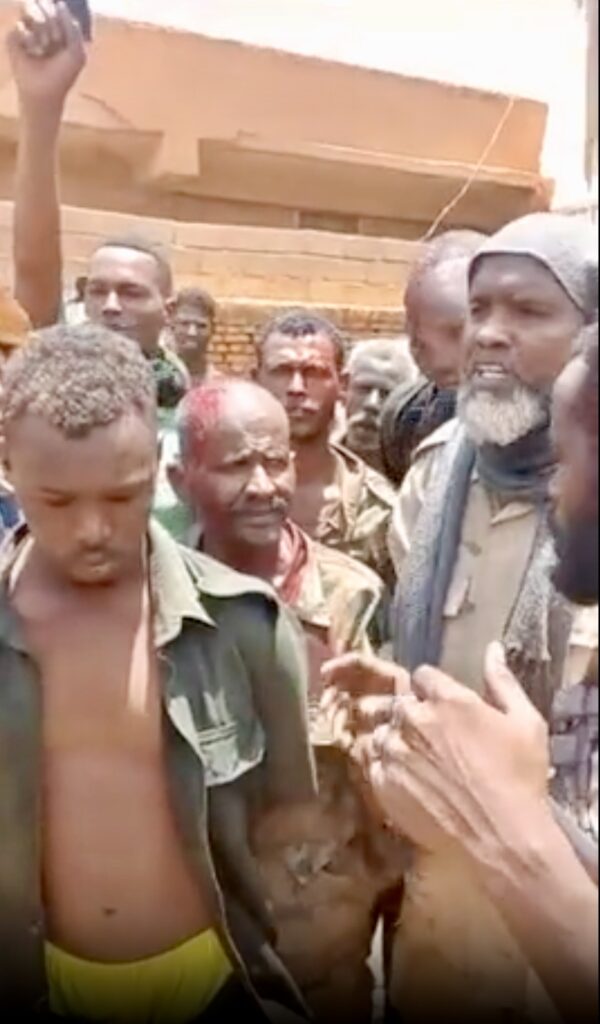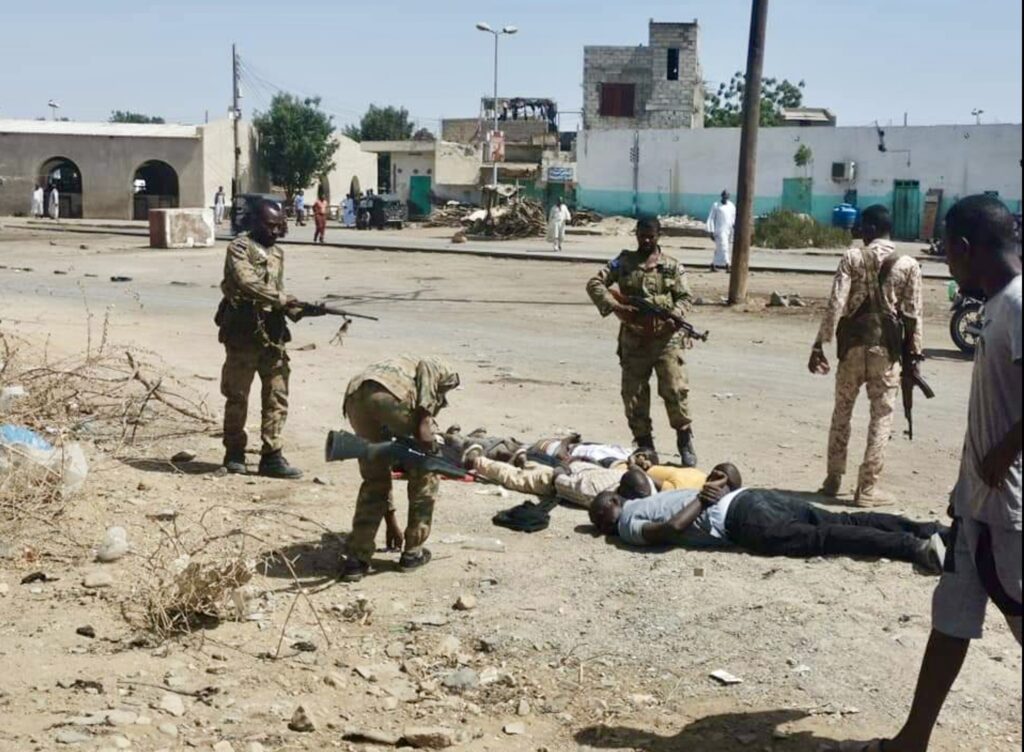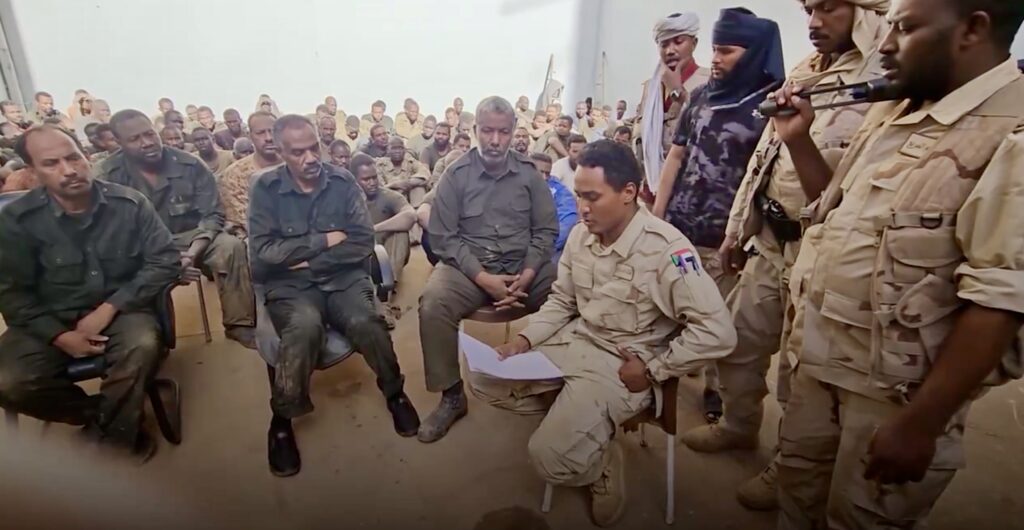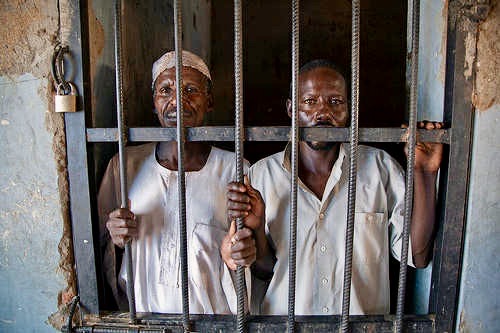Torture and murder- detention centres in Sudan
19 September 2023
On 23 April, as the conflict escalated between the Sudan Armed Forces (SAF) and the paramilitary Rapid Support Forces (RSF) around the presidential palace in the capital, Khartoum, Republican Guards from the SAF detained a young man, Mohamed*. Eventually, they released Mohamed, but it was only a short matter of time that Mohamed was detained again –but this time by the Rapid Support Forces.
Mohamed – whose real name is concealed for security purposes – spent 40 days in the detention centres of both warring parties: 16 days in SAF’s detention centres, and another 24 under RSF custody. He was arrested the first time on Nile Street on 23 April – just eight days after the start of the war. The army soldiers arrested him on suspicion of an affiliation with the Rapid Support Forces. Then, on 7 May, while detained, Mohamed found himself and his fellow detainees caught in the crossfire between the two military forces.
“I was in the middle of these bloody clashes between the army and the RSF that day. I saw people falling dead, one after another. It was a horrible, something that I will not easily forget.”, he told Ayin.
Mohamed and other detainees could hardly sleep. By dawn the next day, the army was gone –it appeared they withdrew and left their former detainees. Mohamed and other detainees decided to go out into the street.
“On that day, scenes of death and devastation overshadowed everything,” Mohamed told Ayin. “I decided to go east, hoping to reach Al Mak Nimr Bridge that links Khartoum with Bahri.” When he arrived there, RSF vehicles could be seen everywhere, and they quickly arrested him. “Now I found myself arrested again –but this time by the other side of the war.”

Killing and Torture
The RSF took Mohamed to “Arabic Market” in downtown Khartoum. A crowded detention centre, where Mohamed said he witnessed detainees being tortured. Later, the RSF transferred him to another detention centre at Sudan Open University in the Riyadh neighbourhood, eastern Khartoum. Mohamed spent 24 days at the university detention centre among 800 other captives, including army officers and soldiers, police officers, merchants, and civilians. No charges against Mohamed were ever presented.
The place was overcrowded and drinking water was scarce. While Mohamed was never tortured, other detainees were –some even succumbed to the severe punishment. Other detainees became ill from contracting diseases while in captivity. Any detainee who tried to escape was shot dead.
“Due to the fear of torture and disease, some detainees tried to run away but the RSF bullets were faster,” he said, “many died while trying to escape.” Mohamed was eventually released and prayed for this war to end. His experience is, unfortunately, not unique to those living in the capital during the conflict. At any time either warring party can arrest civilians on suspicion of allegiance to the other warring party, he explained.
In July, Sudanese human rights organisations told Reuters that the RSF had detained more than 5,000 people in the capital and were keeping them in inhumane conditions.

A Shocking Report
According to a report by the Emergency Lawyers Association, an intrepid group of lawyers who voluntarily support civilians affected by the conflict, there are 44 detention centres affiliated with the RSF in Khartoum State, while eight detention centres are linked to the army.
Whether detained by the SAF or RSF, the report details how detainees can face torture, forced labour –and sexual assault. In some cases, the basements of residential areas are used as temporary detention centres –often lacking ventilation with Khartoum’s excruciating heat. The report also highlights the disastrous lack of health and medical services. Those with chronic illnesses were often denied medical attention, the report said, while others succumbed to injuries inflicted while under torture.
The warring parties have even detained children. On 15 September, the International Committee of the Red Cross (ICRC) said it facilitated an operation in which more than 30 previously detained children were released by the army. The ICRC said they have transported the children safely by road out of Khartoum to Wad Medani.

Human Rights Front
While advocating for the release of detainees currently being held captive by the warring parties, the Emergency Lawyers Association are also trying to document these abuses in a bid to hold the perpetrators to account. Osman Al Besry, a member of the association, calls on all Sudanese human rights organisations to adopt a far-reaching campaign to lobby for the release of all detainees. “The conceivable mechanisms to stop the arrests or limit the violations against civilians is to build a wide front for rights and freedoms, documenting violations committed by both parties and submit this to relevant organisations.”
On 10 September, eight independent civil and professional bodies announced their agreement to establish a Unified Jurist Centre in Sudan, designed to monitor and document war crimes and provide legal, psychological and societal support to victims of the war.
Nasr El-Deen Yousif, a lawyer and Centre member, said that there is a set of principles in both the international conventions and the Sudanese internal laws – such as the Code of Criminal Procedure and the Criminal Act – that consider torture a grave and prohibited crime, even under a declared state of an emergency by the government. He pointed out that those crimes are serious and punishable crimes regardless of the identity of the offenders.
Yousif explained to Ayin that unlawful arrest is also a serious crime as it conflicts with the rule of the law, pointing out that the implementation of the law – and considering no one above it – makes societies stable. “There are no justifications for committing crimes such as unlawful detention or crimes of torture,” he added.
Enforced disappearance is prohibited in accordance with the International Convention for the Protection of All Persons from Enforced Disappearance, which was signed and ratified by Sudan in February 2021, and it is a crime punishable by the Sudanese Criminal Act.
* Name changed to protect identity


